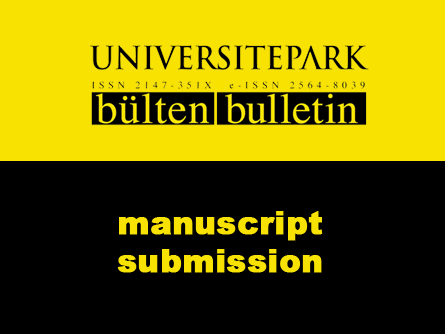1  |
The Impact of COVID-19 Pandemic on Academic Laboratories
pp. 7-24 | Published Online: October 2023 | DOI: 10.22521/unibulletin.2023.121.1
Albert Koomson , Jonathan Ntow , Prosper Dordunu , Emmanuel Birikorang , Douglas Tetteh Ayitey , Richard Sowah Anum , Dennis Doe
 Full text PDF |
Abstract |
320 |
170 Full text PDF |
Abstract |
320 |
170
Abstract
|
Background/purpose – The COVID-19 pandemic plagued economies and education at all levels and on a global scale. However, there has been limited research on the impact of the pandemic on academic laboratories. This brief review expounds the impact of the COVID-19 pandemic on academic laboratories by discussing their roles and responses on different continents during the peak of the crisis and since. The study also relates the pandemic’s impact on academic laboratories to existing theories of science education and suggests recommendations for future practices.
Materials/methods – This review employed the PRISMA item checklist and Arksey and O’Malley’s framework, with minor adjustments applied to best suit the aims of this review. Information was obtained from the PubMed® and JSTOR bibliographic databases, plus via the Google Scholar academic search engine.
Results – The study demonstrated how most academic laboratories in developed countries responded rapidly to the pandemic; whereas, most African academic laboratories were unproductive due to emergent challenges faced such as inadequate funding for virtual laboratories and e-learning infrastructure, Internet instability, and other issues related to technology and its wider accessibility. The study highlighted how some existing theories of science education were affected by the pandemic, followed by what academic laboratories should have done differently.
Conclusion – This review clarified some of the expedient responses needed for academic laboratories to be productive during crises such as a pandemic. The study revealed that embracing certain suggested recommendations could help build more resilient academic laboratories globally, and help to sustain laboratory practices and operations whilst championing quality education.
|
Keywords: Academic laboratories, COVID-19 impact, scientific research, development.
|
2  |
Boredom and Coping Strategies in Online Classes among College Students: A Survey from the Philippines
pp. 25-40 | Published Online: October 2023 | DOI: 10.22521/unibulletin.2023.121.2
Louie Giray , Jamaicah Jane Sandoval , Enzzel Kim Ambas , Ma. Annie Bonador , Mark John Recaplaza
 Full text PDF |
Abstract |
256 |
131 Full text PDF |
Abstract |
256 |
131
Abstract
|
Background/purpose – This study explored Filipino college students’ boredom in online higher education and the coping strategies they employed.
Materials/methods – The study involved surveying 166 students who were enrolled to various online courses across multiple universities and college programs in Metro Manila, Philippines, following the pandemic lockdown. We adopted a non-experimental, cross-sectional approach and utilized a questionnaire adapted from various survey instruments. The collected data were then analyzed using descriptive statistics.
Results – The majority of the participant students claimed that online classes were more boring than in-person classes, citing the instructor’s personality, the quality of education, and their own personal attitude as contributory factors. The college students experienced boredom during online classes, with class-related boredom being the most significant. They stated that their minds would wander, and they would feel tired and sleepy during online classes. Their preferred approach to deal with boredom was cognitive, where they reminded themselves of the importance of the class. However, the least preferred approach was behavioral, choosing not to ask their instructors if they could do something different. As per their expectations, they wanted online education to be interesting and enjoyable.
Conclusion – The study reveals a high prevalence of boredom among students during online higher education classes, indicating a need for improvements in online course design and delivery. The findings also provide valuable insight into the unique challenges faced by students and their experiences in the Philippine context, and could be used to guide policy and program development to address academic boredom and improve the overall online learning experience.
|
Keywords: boredom, academic boredom, coping strategies, online classes, class-related boredom, Filipino students
|
3  |
Tanzania’s higher Education Market Policy Reforms and the Quest for Fulfilling the Core University Mission
pp. 41-62 | Published Online: October 2023 | DOI: 10.22521/unibulletin.2023.121.3
Neema Mariki Mkunde , Hillary Dachi
 Full text PDF |
Abstract |
259 |
144 Full text PDF |
Abstract |
259 |
144
Abstract
|
Background/purpose – The purpose of the study was to explore how the implementation of Market Policy Reforms (MPR) has contributed to public higher institutions (HEIs) achievement of the core mission of excellence in teaching, innovative research, and academic publications.
Materials/methods – It employed a qualitative approach with a multiple case design. Data were collected from two public universities through interviews, focus group discussions, and documentary reviews. Primary data were thematically analyzed and presented as excerpts and narrations. Secondary data were presented in tabular format and illustrative figures.
Results – The findings showed that expansion in student numbers was disproportionate to the resources available. Teaching and assessments were emphasized at the expense of other core functions. Research and publication outputs were dependent on donor funding and international collaborations. Universities have built partnerships with communities, albeit on a small scale. The financial position of universities has improved but revenue streams have not substituted government subventions as a core source of funding.
Conclusion – The study concluded generally that MPRs have not significantly solved problems adversely affecting the quest by universities to achieve their core mission.
|
Keywords: Higher education, Neo-liberal policies, Market policy reforms, Tanzania
|
4  |
Tuition Fee Settings of Universities in Azerbaijan
pp. 63-75 | Published Online: October 2023 | DOI: 10.22521/unibulletin.2023.121.4
Rima Mammadova
 Full text PDF |
Abstract |
410 |
120 Full text PDF |
Abstract |
410 |
120
Abstract
|
Background/purpose – The lack of research on higher education institution marketing, especially regarding tuition fee setting by Azerbaijani universities, is the reason for conducting this study. Hence, this study aims to identify the current state of tuition fee settings in state and private universities in Azerbaijan.
|
Materials/methods – To achieve this, the research systematically examined peer-reviewed articles published in reputable journals. A search query that incorporated important terms such as financing of HEIs, students as customers, and price-setting approaches was applied to a number of databases. Data about 15 private and state universities was collected from reliable sources and the current situation in private and state Azerbaijani universities was discussed.
Results – Private universities in Azerbaijan should apply marketing strategies more and pay attention very carefully to their price-setting approach in order to attract more students and survive in the current marketplace. Price/tuition fee-setting policies for all universities in Azerbaijan should be prepared and approved by the government in order to prevent artificially increased prices.
Conclusion – This study makes a unique contribution to Azerbaijani science, and may also be a valuable resource for researchers interested in higher education marketing in Azerbaijan.
Keywords: Universities, tuition fee, price setting, Azerbaijan, university marketing
|
